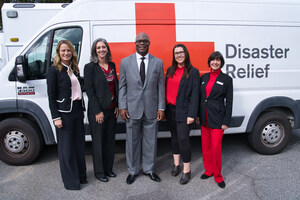WASHINGTON, March 15, 2011 /PRNewswire-USNewswire/ -- The American Red Cross today announced an initial contribution of $10 million to the Japanese Red Cross Society to assist in its ongoing efforts to provide medical care and relief assistance to the people of Japan following the March 11 earthquake and tsunami.
(Logo: http://photos.prnewswire.com/prnh/20090108/RedCrossLOGO)
"We are grateful for the American public's generosity and compassion following what has been declared one of the most devastating earthquakes in history," said David Meltzer, senior vice president of international services with the American Red Cross. "The American Red Cross is in a unique position to help channel that support to our partner in Japan that is playing a critical humanitarian role and comforting the survivors."
In addition to financial assistance, a disaster management expert from the American Red Cross arrived in Japan Monday for a week-long mission. She is serving on a seven-person, international team focused on providing high-level support and advice to the Japanese Red Cross, which continues to support the Japanese government's earthquake and tsunami response.
The Japanese Red Cross is a highly experienced disaster relief organization with two million volunteers nationwide. Many local volunteers took immediate action following the disaster by distributing relief items, offering hot meals, clearing debris and providing medical transportation.
As concerns mount about damage to nuclear power plants in the north, the Japanese Red Cross is also focused on supporting the 200,000 people who have been evacuated from the exclusion zone. Many of the Japanese Red Cross branch offices have trained nuclear decontamination teams and equipment, including special tents for decontamination which can be used to support a government response. A specialist medical team at the Nagasaki Red Cross hospital is on standby, ready to receive patients if people become ill as a result of radiation poisoning. Other hospitals in the area are monitoring radiation levels to protect the patients they are currently treating.
At public shelters and throughout the country, local volunteers are handing out relief items, including more than 65,000 blankets which are of great comfort to the displaced, many of whom had been sleeping outdoors, in their vehicles and wherever else they can find space since the earthquake.
"There is a real concern for the elderly, who are extremely vulnerable to hypothermia," said Meltzer. "Japan is a country with a high proportion of seniors, and the Red Cross will be doing all it can to support them through this dreadful experience."
More than 100 medical teams, made up of more than 700 people, including doctors and nurses have been providing assistance in the most affected areas through mobile medical clinics. Trained nurses with the Japanese Red Cross are also offering psychosocial support to traumatized survivors.
While the damage is undeniably severe and needs enormous, thousands of survivors are grateful for their lives post-disaster. Investments in early-warning systems and disaster preparedness and other training programs, including those from the American Red Cross following the 2004 Indian Ocean tsunami, paid off in the Pacific Basin last week. The Japanese government's own system helped hundreds of thousands evacuate to the approximately 2,000 shelters supported by the Japanese Red Cross before the first tsunami waves reached the mainland. And Red Cross societies in Tuvalu, Cook Islands, Palau and Fiji undoubtedly saved lives by alerting and evacuating residents when the tsunami warnings sounded.
Those who want to help can go to www.redcross.org and donate to Japan Earthquake and Pacific Tsunami. Gifts to the American Red Cross will support our disaster relief efforts to help those affected by the earthquake in Japan and tsunami throughout the Pacific. On those rare occasions when donations exceed American Red Cross expenses for a specific crisis, contributions are used to prepare for and service victims of other crises.
In the coming weeks, the American Red Cross expects to make additional contributions to support the humanitarian response. Donations received from American Red Cross and other Red Cross partners will aid Japan's relief and recovery efforts through the Japanese Red Cross and possibly other organizations as experts on the ground determine the best way forward. Donations received by the Japanese Red Cross from people within Japan will be pooled and managed by an independent grant disbursement committee, which will include the Japanese Red Cross. The grants will be disbursed in installments in order to responsibly and effectively respond to the country's evolving relief and recovery needs.
SOURCE American Red Cross
WANT YOUR COMPANY'S NEWS FEATURED ON PRNEWSWIRE.COM?
Newsrooms &
Influencers
Digital Media
Outlets
Journalists
Opted In





Share this article